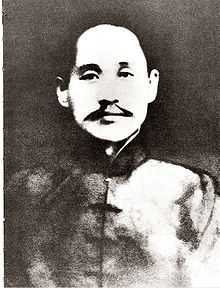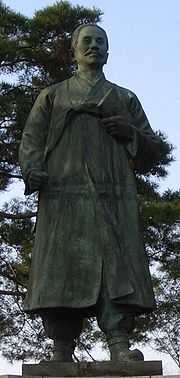Shin Chaeho
| Shin Chaeho | |
 | |
| Korean name | |
|---|---|
| Hangul | 신채호 |
| Hanja | 申采浩 |
| Revised Romanization | Sin Chae-ho |
| McCune–Reischauer | Sin Ch'aeho, Shin Ch'aeho, |
| Pen name | |
| Hangul | 단재 |
| Hanja | 丹齋 |
| Revised Romanization | Danjae |
| McCune–Reischauer | Tanjae |

Shin Chae-ho (1880–1936) was a Korean independence activist, historian, nationalist and the founder of the nationalist historiography of Korea. He is often referred to as “Korea’s greatest historian” by both North and South Koreans. Two of his works, Doksa Sillon (“A New Reading of History”) written in 1908, and Joseon Sanggosa (“The Early History of Joseon”) in 1924/25 laid out the first ethnic (minjok)-based linear national history of Korea. He is also famous for his claim of the Manchurian connection to Korea’s ancient past. Later in his life in exile in China, Shin joined an anarchist organization and wrote articles on anti-Japanese imperialism in anarchist newspapers.
Biography
Shin was born on November 7, 1880. His grandfather was an official in the royal advisory department. His literary name was Tansaeng, which was later changed to Tanjae. Shin had been educated in a traditional Korean way by his grandfather with no exposure to Western thoughts, and received a doctoral degree from the prestigious state-sponsored Confucian academy Seonggyungwan in 1905. He was appointed to become a teacher in the same school, but because of his strong nationalist feelings, he vacated the position upon learning that Japan had claimed Korea as its protectorate. He served on the editorial boards for two of the new papers, the Hwangseong Sinmun (Hangul: 황성신문, Hanja: 皇城新聞) and the Daehan Maeil Sinbo (Hangul: 대한매일신보, Hanja: 大韓每日新報). Shin used his literary prestige to support the Patriotic Enlightenment Movement.
He exiled himself to China in 1910 when Japan declared its annexation of Korea. He helped open the Qingdao Council with his comrades in exile, and also organized the New Korea Youth Society in China in 1915. He was briefly associated with the Shanghai Provisional Government in 1919. Later he became more interested in anarchist thoughts and activities, and got involved in drafting The Manifesto of the Korean Revolution (1923). Shin joined the Eastern Anarchist Association (Hangul: 동방 무정부주의 연맹, Hanja: 東方無政府主義聯盟) some time around 1925-1927.
Shin was arrested by the local police in Keelung, Taiwan (then a Japanese colony) in May 1928 when he smuggled counterfeit funds from Peking with a fake Chinese identity by the name of Yu Byeong-taek (Hangul: 유병택, Hanja: 柳烟澤) in order to gain funding for activities of the Eastern Anarchist Association. His first trial took place in Dairen, China (then under Japanese administration), on July 19, 1928, and it continued until April 1930.
Shin was sentenced 10 years in prison, and died in prison of a cerebral hemorrhage in 1936.[1]
Shin Chaeho’s nationalist historiography
The History of Korean Minjok (ethnicity)
Shin was the first historian to focus on the Korean minjok, and narrated Korean history in terms of its minjok history. For Shin, minjok and history were mutually defining. As he said in the preface of the Doksa Sillon, “if one dismisses the minjok, there is no history.” Shin emphasized the ancientness of the Korean minjok history, elevated the status of the mythical figure, Tangun, and located the host minjok, Puyo. Shin launched a vision of the Korean nation as a historically defined minjok (or ethnic) entity.
Korea’s Own Genealogy
The purpose of Shin's minjok discourse was to establish Korea’s genealogical history as separate from China and Japan. Shin purposefully opposed the Sadae Juui (Hangul: 사대주의, Hanja: 事大主義), or Confucian historiography that puts China at the center. In order to establish Korea’s own history, Shin advocated constructing a new ‘autonomous spirit’ through rediscovering Korean uniqueness in its history, legends, heroes (such as Yi Sunsin) and events. Replacing the story of Gija by the Dangun legend was one of the important ways to establish Korea’s uniqueness.
Social Darwinism
Shin conceived the minjok as almost an organic, biological entity, and regarded history as a process of competitions among groups. He perceived the entire past of Korean as a national struggle against its neighbors. In Joseon Sanggosa, he elaborated a view of history that evolves around competitions between the “I” and “non-I,” which shows a strong Social Darwinian nature. The adoption of Social Darwinism also signifies a radical shift from traditional Confucian historiography as well as a deviation from Anarchism, since the struggles between states and nations is considered by Anarchists to be the upper class controlling the lower classes, whereas Social Darwinism encourages the death of the weaker social classes.
References
- ↑ Korea Times, Dec. 3, 1994. Cited by Bruce Cumings, Korea's Place in the Sun (2005), p. 156.
- Allen, Michael (Dec 2001). "Ambivalent Social Darwinism in Korea". International Journal of Korean History (2).
- Chang Ūl-Byōng (Nov 1986). "Shin Ch'ae-ho's Nationalism and Anarchism". Korea Journal.
- Em, Henry (1995). Nationalist Discourse in Modern Korea: Minjok as a Democratic Imaginary (Ph.D dissertation). University of Chicago.
- Kim Gi-seung (Dec 2001). "Embracing and Overcoming of Social Darwinism by Confucian Intellectuals in the Early 20th Century Korea". International Journal of Korean History (2).
- Lee Ke-baik (Sep 1979). "Nationalism in Tanjae's Historical Study". Korea Journal.
- Pai, Hyung Il (2000). Constructing Korean Origins A Critical Review of Archaeology, Historiography, and Racial Myth in Korean State Formation Theories. Cambridge, MA: Harvard University Asia Center.
- Robinson, Michael E (June 1986). "Sin Ch'ae-ho: Portrait of a Patriot". Korean Culture 7 (2): 4–14.
- Schmid, Andre (2002). Korea between Empires, 1895-1919. New York: Columbia University Press. ISBN 0231125380. OCLC 48618117.
- Schmid, Andre (Feb 1997). "Rediscovering Manchuria: Sin Ch’aeho and the Politics of Territorial History in Korea". Journal of Asian Studies (1): 56.
- Shin Yong-ha (Dec 1980). "Enlightenment Thought of Shin Ch'aeho". Korea Journal.
- Song Chae-So (Dec 1980). "The Changes of Tanjae's Thought Seen in "The Dream Sky" and "The War of the Dragons"". Korea Journal.
See also
| Wikimedia Commons has media related to Shin Chaeho. |